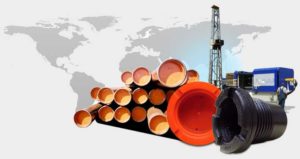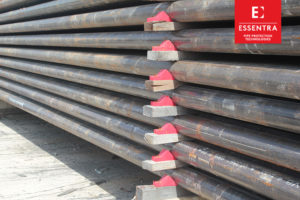The North Sea oil industry in Scotland, UK, dates from the mid-1960s when the first exploration licenses were issued. Although the first well was drilled in 1967, no oil came ashore until the pipeline infrastructure was completed in 1975. Around this industry, a vast network of supporting industries grew, and prominent among them was MSI UK, based in Aberdeen, supplying pipe thread protectors and other essential products to support the pipeline system.
MSI UK
For most of the company’s history in the UK, it has actually been known as MSI Oilfield Products and is still often referred to by that name. It only became known as MSI in 2013, when the parent group took on this name. The name was chosen to reflect the fact that the company manufactures a whole wealth of products that are small in size yet absolutely essential to the systems for which they are provided, their huge importance being out of all proportion to their size.
This is certainly true of pipe thread protectors, small items manufactured for the oil and gas industry, including the North Sea oil drilling platforms. Pipes always represent one of the most massive costs for the oil and gas industry, and this cost is multiplied many times for offshore production. In the North Sea, apart from the pipes around the drilling rigs themselves, there is an extraordinary network of pipelines to carry the oil extracted from the platforms to the coastal terminals.
The best known of these is the Forties pipeline operated by BP, which is 110 miles long and can carry up to 1 million barrels of oil a day, from the Forties oil field to Cruden Bay near Aberdeen. BP also operates another 110-mile pipeline from the Ninian oil field to the Sullom Voe terminal in Shetland. Pipelines operated by Total include a 150-mile pipeline from the Bruce and Forties fields to Cruden Bay and a 130-mile pipeline from the Piper field to Orkney.
This massive infrastructure has to be maintained in absolutely 100% condition at all times, and pipe thread protectors, small as they are, play a crucial role in preventing leaks. One major North Sea pipeline, the Brent system, had to be shut down in 2013 after oil leaks were detected in smaller pipes in the Cormorant Alpha platform, through which the Brent pipeline passes. Not only was this shutdown hugely costly in financial terms, but the leak could potentially have caused an explosion, as oil contains a small amount of gas.
However, although the MSI UK facility is located within easy reach of the North Sea oil industry, its reach extends much farther than that. Saudi Arabia and Russia have for many years been the world’s biggest oil producers, until they were overtaken in 2014 by the USA, thanks to shale rock extraction. Both Saudi Arabia and Russia look to MSI for pipe thread protectors and other OCTG (oil country tubular goods) requirements, with the requirements in Russia growing along with the country’s drilling activities.
The MSI UK Facility in Aberdeen
Global demand for energy continues to increase relentlessly, and as traditional reserves become exhausted, oil and gas are being sought in ever harsher environments, including deepwater offshore operations. The Piper Alpha disaster off the coast of Aberdeen, Scotland, in 1988, with inadequate maintenance procedures being blamed for the deaths of 167 oil rig workers, serves as a reminder of how essential it is to take no chances with the safety of pipeline systems. The MSI UK facility will continue to supply protection products, including pipe thread protectors, for the support of some of the world’s most extreme oil extraction operations. Contact us today with any questions.




